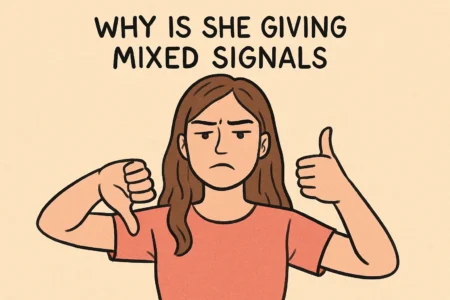It’s a quiet thing, isn’t it? A creeping feeling. It’s not one big, dramatic fight. Not a single moment of betrayal. It’s the slow, steady erosion of acknowledgment. It’s the coffee you make every single morning that no longer gets a “thank you.” It’s the silent assumption that you’ll be the one to cancel your plans when the dog gets sick. It’s the deafening quiet after you’ve spent hours cleaning the house, a quiet that screams, “This is just what you do.” This is the heavy, heart-sinking feeling of being taken for granted.
I know this feeling down to my bones. It can make you feel invisible in your own life. Like you’ve become part of the furniture in a home you helped build. You start to question everything. Are my efforts seen? Do my contributions matter? Have I simply become a set of expectations in my partner’s mind?
But I’ve learned something crucial: this feeling is not a death sentence for your relationship. It’s a signal. Think of it as a check-engine light. It’s asking you to look under the hood and see what needs a tune-up. This guide is about giving you the tools to do just that—to go from feeling overlooked to feeling seen, cherished, and truly valued.
More in Relationship Health Category
Key Takeaways
- Spot the Warning Signs: The feeling often starts small, with the disappearance of courtesies like “thank you,” and snowballs into assumptions about your roles and responsibilities.
- Understand the “Why”: This problem rarely comes from a bad place. It’s usually a byproduct of comfort sliding into complacency, where routine smothers appreciation.
- Talk, Don’t Accuse: To fix this, you need to communicate with care. Use “I feel” statements to share your experience instead of accusatory “you always” language. Your timing and tone are everything.
- Draw Your Lines: Boundaries aren’t about building walls; they’re about protecting your well-being and keeping the partnership balanced. They respectfully teach others how to treat you.
- Bring Back Gratitude on Purpose: You can break the cycle by modeling appreciation yourself and creating small, daily rituals that make gratitude a habit for both of you.
Does It Feel Like You’ve Become Invisible?
The first step is always seeing it for what it is. Sometimes, being taken for granted happens so gradually you barely notice. It just becomes your new normal. You adapt, you absorb, you carry on. But a little piece of you gets heavier each day. You have to acknowledge the specific ways this is showing up before you can ever hope to fix it. You have to put a name to the quiet hurts that have been piling up.
Are “Thank You” and “I Appreciate You” Extinct?
Seriously, think about it. When was the last time you heard those words? And not just as a reflex, but with real meaning behind them. The death of basic courtesies is often the first red flag. These little phrases are the currency of appreciation in a relationship. They’re the verbal nods that say, “I see you, and what you did matters to me.” When they disappear, the silence is loud.
I’ll never forget one specific evening a few years ago. I was dating someone, and I knew he’d had a horrible week at work. I decided to plan the perfect, stress-free Friday night. I bought his favorite steak. I found that bottle of red wine he loved. I even made dessert from scratch, which, for me, is a huge deal. When he got home, he barely looked up from his phone, ate the entire meal while watching TV, and then went to bed. Not one word about the food. Not a single “thank you.” All that effort I poured out just vanished into thin air. I felt completely and utterly taken for granted. The loneliness in that moment was crushing.
Has Your Role Been Assigned Without Your Consent?
Assumptions are the silent killers of a partnership. This is what happens when your partner just starts expecting you to handle certain things, no discussion needed. You’re always the one making social plans. You’re always the one remembering birthdays and buying gifts. You’re always the one doing the emotional heavy lifting when a family crisis hits.
It’s not that you necessarily mind doing these things. It’s the expectation that you will do them that stings so badly. It changes the dynamic from a partnership—two people choosing to contribute—to a silent contract where your role has been assigned to you. You start to feel less like a partner and more like an employee in your own relationship, stuck with a job description you never even applied for.
So Why Does This “Taken for Granted” Feeling Happen Anyway?
Getting to the root of the problem is key because, most of the time, your partner isn’t some villain plotting to make you feel unappreciated. Good people with good hearts fall into this trap all the time. Relationships are messy, and the slide from appreciative to complacent is a slippery one. It’s rarely a conscious decision. It’s a slow drift, pulled by the currents of everyday life. Figuring out why it’s happening helps you tackle the problem with more empathy and less anger, which is the only way to find a real solution.
Did Your Comfort Zone Become a Complacency Trap?
Every long-term relationship changes. That initial, heart-pounding, can’t-think-straight phase of a new romance naturally settles into a comfortable, secure rhythm. And comfort is a wonderful thing! It’s the foundation of a partnership that lasts. But there’s a razor-thin line between comfort and complacency. Comfort is knowing you have a safe place to land. Complacency is forgetting to be grateful for that landing spot.
When you get complacent, you stop trying. You stop noticing the little things. You just assume your partner will always be there, doing what they do, no acknowledgment needed. The daily grind—work, bills, chores, kids—can easily swallow up the intentional acts of love that were once everywhere. You slip into autopilot. And that’s when the feeling of being taken for granted puts down roots.
Are Unspoken Expectations Driving a Wedge Between You?
Do you ever find yourself thinking, “He should know I need help with this,” or “She should realize how much that hurt my feelings”? We fall into this trap of thinking our partners are mind readers, that our needs are as obvious to them as they are to us. This is such a dangerous game. When your expectations are unspoken, they become invisible landmines. You’re just waiting for your partner to do something they have no idea you want them to do.
Then, when they inevitably fail to meet that secret expectation, resentment starts to bubble up. This creates a silent rift. Both of you feel disconnected, but neither one knows why. Your partner is clueless, and you’re seething because you feel let down and, you guessed it, taken for granted. That isn’t fair to either of you. A healthy relationship runs on communication, not psychic powers.
How Do You Start This Conversation Without Starting a War?
This is often the trickiest part. You’re hurt, you’re frustrated, and your first impulse might be to just unload a list of all their wrongdoings. But launching an attack will only force your partner into a defensive crouch. You’ll end up in an argument where nobody wins and nothing changes. The goal here isn’t to prove you’re right. The goal is to reconnect and help your partner understand what you’re feeling. That takes strategy. It takes gentleness. It takes a hell of a lot of courage. You’re trying to build a bridge, not a battlefield.
What’s the Best Way to Bring This Up Without an Explosion?
Timing and phrasing. That’s the whole game. Don’t start this conversation when one of you is stressed, exhausted, or halfway out the door. Pick a calm, neutral moment. A time when you can both talk without a million distractions. Then, frame everything around your feelings using “I feel” statements. This is a total game-changer. An “I feel” statement is about your experience. A “you” statement is an accusation.
For example, instead of, “You never help me around the house,” which will 100% start a fight, try this: “Lately, I’ve been feeling really overwhelmed with all the household chores, and I’m starting to feel a little alone in it.” The first version is an attack. The second is an invitation for them to see things from your side and solve a problem together.
Can Specific Examples Actually Make Your Point Clearer?
Vague complaints are impossible to fix. “You don’t appreciate me” just leaves your partner confused and defensive. What does that even mean? What are they supposed to do about it? They’re much more likely to get it if you can point to a concrete example of when you felt that way. The key is to do it without an ounce of blame in your voice.
I had to learn this the hard way. For a while, my husband and I were stuck in a rut where I felt like I was doing everything. My first few attempts to talk about it were total disasters. Then, I tried a new tactic. I said, “Hey, remember last Tuesday when that big project at work blew up and I was on stressful calls all day? I was really struggling when I got home, and I could have really used a hug, or even just to hear you say ‘that sounds tough.’
When that didn’t happen, I felt really alone and taken for granted.” He got it instantly. It wasn’t a fuzzy accusation; it was a specific moment. It gave him a clear picture of what I needed and completely changed how we talk about supporting each other.
What If Talking Simply Isn’t Enough?
Sometimes, one good conversation isn’t a magic pill. You talk it out, things get better for a week, maybe two. Then, slowly but surely, the old habits creep back in. It’s beyond frustrating. It can make you feel like your needs were heard but ultimately dismissed. If you’re stuck in this loop, it’s a sign you need to move beyond words and start making some real, structural changes in your relationship. This is where boundaries and intentional actions come in. It’s time to back up your words with consistent behavior.
Are Your Boundaries Crystal Clear, or Kind of Blurry?
Many of us hear the word “boundaries” and think it sounds harsh or selfish. Nothing could be further from the truth. Healthy boundaries are one of the kindest gifts you can give your relationship. A boundary isn’t a wall to keep someone out. It’s a clear line you draw to protect your own energy and peace of mind. It’s about teaching your partner how you need to be treated. If you’ve spent years being endlessly available and accommodating, you may have accidentally taught your partner that your needs always come last.
Setting a boundary is just about respectfully stating what you will and will not do. It’s not a threat. It’s just a fact about your own limits.
- Boundary Example 1: “I love helping you with your projects, but I can’t keep dropping my own work for last-minute emergencies. From now on, I’ll need at least a day’s notice if you need my help.”
- Boundary Example 2: “I need about 30 minutes to myself to decompress after work before I can switch gears and talk about our day. It’s something I really need.”
- Boundary Example 3: “It’s important to me that we plan our vacations together. The pressure of it all falling on me is too much, so I won’t be planning our next trip by myself.”
How Can You Intentionally Reintroduce Appreciation into Your Routine?
You can’t just demand more appreciation from your partner. It doesn’t work like that. But you can create an environment where appreciation can grow again. Often, the best way to do this is to model the exact behavior you want to see. Start actively and verbally appreciating your partner for the things they do, no matter how small. “Thank you so much for taking out the trash; that really helps me out.” “I really appreciate you just letting me vent about my day.” When you make appreciation a regular part of how you talk, it tends to be contagious.
Another powerful move is to create a small ritual. It could be as simple as a five-minute, screen-free check-in at the end of the day, where you each share one thing you were grateful for about the other person. It might feel a little forced at first, but these small, intentional acts are a powerful antidote to feeling taken for granted. They rebuild a culture of gratitude, one day at a time.
Is It Time to Deliberately Bring Back the Spark?
When you’re stuck in a rut of feeling unappreciated, romance and excitement can seem like a distant memory. The daily grind is a master at snuffing out that spark. Breaking the cycle of complacency often means you have to deliberately shake things up. You have to re-inject novelty and fun back into your lives. It’s about remembering you aren’t just co-managers of a household. You are two people who fell in love. Sometimes you have to actively remind yourselves why.
When Was the Last Time You Did Something Genuinely New Together?
Routines are comfortable. They are also the breeding ground for being taken for granted. Doing the same things day after day puts your relationship on autopilot. Breaking that routine with new experiences can work miracles. It’s science. Research has consistently shown that couples who engage in novel activities together report much higher relationship satisfaction. As a study from the University of California, Berkeley, points out, shared experiences—especially new and challenging ones—can reignite feelings of closeness and bonding.
This doesn’t mean you need a big, expensive vacation. It could be a cooking class, a new hiking trail, a museum in a nearby town, or even a new board game. The goal is just to create new memories and see each other in a different light, outside the tired context of your everyday roles.
I remember when my husband and I were feeling super disconnected. Everything felt like a chore. We started something we call a “date night draft.” At the start of each month, we both secretly write down three date ideas—anything from a new restaurant to building a pillow fort in the living room—and toss them in a jar. Every Friday, we draw one. It completely changed our weekends from something to manage into something to look forward to. The burden of planning was gone. We were a team again. And we made sure we never took for granted our time together.
How Do You Shift from ‘Have To’ to ‘Get To’?
So much of a long-term relationship gets bogged down by the “have tos.” We have to do the laundry. We have to pay the bills. We have to go to that family dinner. This language of obligation sucks the joy right out of your partnership. The key is to consciously reframe these chores and find your way back to a “get to” mentality.
This means rediscovering the “why” behind what you do. You aren’t just doing chores; you are contributing to a home you love with a person you chose. Can you do a task for your partner as an act of love, not an obligation? For instance, instead of sighing about making dinner, could you think, “I get to make this meal because I know it will make my partner’s stressful day a little bit better”? It’s a mindset shift, for sure, but it’s a powerful one. It’s the difference between feeling like a resentful employee and feeling like a loving, giving partner.
What if You’re the One Doing the Taking?
This whole article has focused on what to do when you feel unappreciated. But it’s just as important to turn that mirror around. It’s easy to see where others are falling short. It’s much, much harder to see our own complacent behavior. Relationships are a two-way street. It’s entirely possible that while you’ve been feeling taken for granted in some areas, you’ve been unintentionally doing the exact same thing to your partner in others. Honest self-reflection isn’t a sign of weakness. It’s a sign of strength, and it’s vital for a healthy, balanced partnership.
Could You Be Sending the Wrong Signals Without Realizing It?
Take a moment. Be brutally honest with yourself. When was the last time you went out of your way to thank your partner for something they always do? Do you thank them for going to a job they don’t love to support your family? Do you acknowledge the mental load they carry? Are you guilty of being glued to your phone when they’re trying to talk to you? Sometimes, we get so focused on our own needs and our own feelings of being overlooked that we become blind to our partner’s contributions. This isn’t about blaming yourself. It’s about seeing the whole picture.
What Tiny Actions Can You Take Today to Show You Care?
If you have a sneaking suspicion you might be part of the problem, the good news is you can start fixing it right now. Showing appreciation doesn’t require a grand gesture. It’s built in the small, consistent moments of everyday life. It’s about making your partner feel seen and valued, right here, right now.
Here are a few simple things you can do today:
- Give a Specific Thank You: Don’t just say “thanks for everything.” Say, “Thank you so much for making coffee this morning. It made my chaotic morning so much easier.” Specificity matters.
- Send a Random Text: A simple message like, “Just thinking about you and hoping you’re having a good day,” can make someone feel incredibly special. No reason required.
- Take Something Off Their Plate: Notice something that needs to be done—unloading the dishwasher, walking the dog, making that phone call they’ve been dreading—and just do it. Without being asked. And without expecting a trophy for it.
- Actually Listen: When your partner is talking, put your phone down. Turn away from your screen. Give them your full, undivided attention. Show them that in that moment, what they have to say is the most important thing in the world.
Your Relationship Is Worth This Effort
Feeling taken for granted is a painful and profoundly lonely place to be, but it does not have to be the end of your love story. Think of it as a wake-up call. An opportunity to turn toward your partner and rebuild your connection with more intention, more communication, and more gratitude than ever before.
It starts with courage. The courage to gently speak your truth and the willingness to truly listen to theirs. It’s about swapping assumptions for appreciation and kicking complacency to the curb with conscious effort. By drawing your lines, bringing back some fun, and modeling the love you want to receive, you can steer your relationship out of this rough patch and into a place where both of you feel seen, heard, and deeply cherished. It isn’t easy work. But a partnership built on mutual respect and active appreciation is one of the most beautiful things you can ever create. And that is absolutely worth the effort.
FAQ – Taken for Granted

How can I recognize the signs that I am feeling taken for granted in my relationship?
Signs include a decline in polite gestures like thank yous, assumptions about roles and responsibilities, and feeling invisible or unappreciated despite your efforts.
What is the primary reason people fall into complacency in relationships?
Autopilot and familiarity can lead to complacency, where routine smothers appreciation, causing partners to stop trying and noticing each other’s small acts of love.
How can I approach my partner about feeling unappreciated without causing conflict?
Choose a calm, neutral moment, and use ‘I feel’ statements to express your feelings, focusing on specific examples rather than accusations to foster understanding and open communication.
What are effective ways to reintroduce gratitude into a relationship?
Model appreciation by verbalizing gratitude for small acts, and create rituals like daily check-ins to cultivate a culture of gratitude and make appreciation a habit.
What actions can I take today to show my partner I care and help them feel valued?
Express specific thanks, send a thoughtful message, take on small tasks without being asked, and give your full attention during conversations to demonstrate your appreciation.





